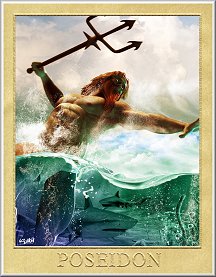
Poseidon
CLICK
TO ENLARGE
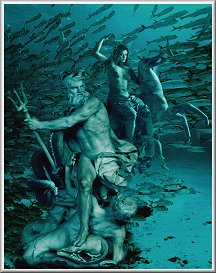
Poseidon
CLICK TO ENLARGE
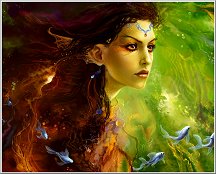
Amphitrite
CLICK TO ENLARGE
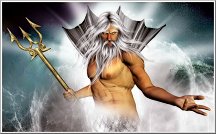
Poseidon
CLICK TO
ENLARGE
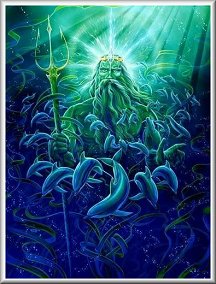
Poseidon
CLICK TO
ENLARGE
|
POSEIDON PAGE TWO
(continued from Page One)
Once there was a dispute between Poseidon and goddess Athena as
to who had patronage of the lands and cities of the area called
Troezen. Zeus intervened before things got too ugly and ordered
them to hold and share the city in common, avoiding further
conflict.
Things did not work out as well for Poseidon during another
disagreement with Athena, this time over the region of Attica.
Both the gods wanted patronage of the mighty city, so they
agreed to hold a public competition to determine the winner.
Poseidon struck a mighty blow with his Trident and a well of sea
water sprung up near the Acropolis. Very impressive but not very
practical.
Wise Athena planted an olive tree, her gift to the citizens.
King Cecrops and the Olympians ruled that Athena's gift was more
fitting (duh!) and thus she was granted patronage and the city
was named Athens in honor of the great goddess.
Needless to say, Poseidon was livid. In retaliation he flooded
Attica, causing great distress. Others claim that rather it was
Zeus who adjudged Athens to Athena, and that Hermes expressly
forbade Poseidon to flood the countryside.
In either case, at the shrine of Erechtheus in Athens, for a
long time there remained preserved an olive tree and a pool of
salt water as reminders of the epic judgment.
Poseidon set eyes on the Oceanid Amphitrite, daughter of Nereus
and Doris, and wanted her as his wife. Distraught and unwilling,
she ran away to Atlas, where she tried to hide from the god of
the sea.
Enamored Poseidon would not be denied. The god of the sea
dispatched many to look for her, among them a man named Delphin.
After much searching and wandering, Delphin located Amphitrite
and managed to persuade her to marry Poseidon, convincing her
that the god's love was sincere.
He delivered the beautiful maiden to Poseidon's palace and even
took upon himself to organize a lavish wedding. In appreciation
for his efforts, Poseidon placed the Dolphin among the
constellations.
Poseidon could be generous, but he could also be vindictive, as
witnessed by his flooding of Attica.
A righteous man named Hierax chose to devote himself to the
goddess Demeter rather than to Poseidon, so the vengeful sea god
unleashed a terrible sea monster against the Teucrians, Hierax's
folk.
Another time, vain Queen Cassiopea of Ethiopia boasted that she
was better and more beautiful than the Nereids, who were
underwater attendants to Poseidon and Amphitrite. The boasts
really ticked off the Nereids, so they beseeched Poseidon to
punish the Queen.
Poseidon sent a sea monster named Cetus, and a flood, to
devastate the land. Oracles declared that this calamity would
only end if Princess Andromeda, daughter to Cepheus and
Cassiopea, was sacrificed to the sea monster.
Luckily for Andromeda, the great hero Perseus, flying by on the
winged horse Pegasus fresh from slaying Medusa, killed the sea
monster, rescued the beautiful maiden and made her his wife.
Poseidon had a plethora of children with a variety of women,
mortal and otherwise, including the famed hero Theseus. Not all
his offspring were human, however - Poseidon once pursued the
Olympian goddess Demeter, who spurned his advances, even turning
herself into a mare so she could hide among a herd of horses.
Seeing through her ruse, Poseidon transformed into a stallion
and was able to capture her. The result of their union was a
horse named Arion, magically capable of human speech.
It was Poseidon who caused Medusa to turn into a hideous
monster. Catching sight of the then-gorgeous maiden, Poseidon
had his way with her, against her wishes, on the floor of the
temple of Athena. As punishment Medusa was then changed by
Athena into a monster with snakes for hair, whose mere glance
would turn a man into stone. Perhaps Athena should have punished
Poseidon instead!
When the hero Perseus beheaded Medusa, Pegasus and Chrysaor
emerged from her neck. The wondrous winged horse Pegasus played
a role in countless myths, while brother Crysaor was depicted as
a handsome young man, son of Poseidon and Medusa. It was said he
became King of Iberia.
In Homer's Iliad, the epic myth about the Trojan War, Poseidon
takes the side of the Greeks, on several occasions taking an
active part in the battles against the Trojans. To be fair, he
does rescue the Trojan named Aeneas, however, when the prince is
wounded by the Greek warrior Achilles.
In Homer's Odyssey, Poseidon goes to great lengths to
hinder Odysseus' efforts to get back home to Ithaca, because the
hero blinded his son, the Cyclops Polyphemus. Poseidon's spite
prevented the Trojan War hero's return to his wife Penelope for
ten torturous years.
Poseidon was nearly always accompanied by another son, Triton,
who was half man, half fish. Triton would blow on his seashell
to announce mighty Poseidon's arrival.
Poseidon's golden chariot was pulled by a team of Hippocamp(us),
which are seahorses, or horses that could ride on the sea.
Both the bull and the horse are associated with Poseidon, but
the bull is linked with many other gods as well, so the horse
can be considered his animal.

[home] [page one]
[page two]
|







